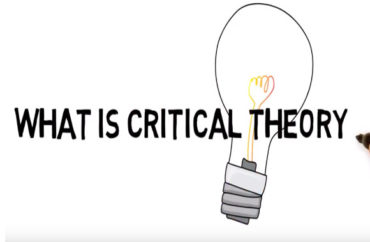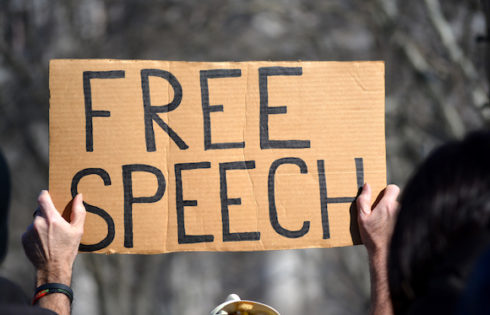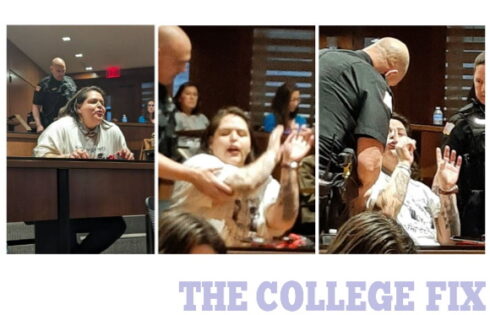
‘Those who don’t belong to African American communities can’t say what’s essential to them’
One of the more unique takes on mandatory coronavirus-induced shut-downs came last week from a former Philadelphia college professor, based on that little ‘ol thing called “critical theory.”
Modern academic — critical — race theory does away with Martin Luther King-ian notions of colorblindness, opting instead for maximum race consciousness. It’s insulting, critical theorists say, if you claim you “don’t see race.”
It’s also racist, natch.
Colleges lectures and teacher professional developments are awash in “experts” huckstering wares such as “white fragility,” “white privilege,” “whiteness,” “white immunity,” and especially victimology to (mostly white, progressive) audiences, eager to show their racial evolution.
Such a mindset ultimately is catastrophic for a multiracial and multicultural society; the sense of national unity is slowly torn asunder.
Author and radio host Solomon Jones, a creative writing adjunct at Temple University from 2004 to 2010, claims “white privilege” was involved in deciding which businesses in Philadelphia were “essential,” and hence, could remain open during coronavirus closures.
In a city where 25% of the population lives in poverty — and where black and brown people are overrepresented in that number — every business owned by a person of color is essential. You don’t need a haircut to live, but to the barber who feeds his family one trim at a time, that business is essential. You can survive without new sneakers, but to the single mother who is a salesperson at a sneaker store, each new pair of kicks is a bottle of milk for her baby. In short, every restaurant, every storefront, every underground example of entrepreneurship is essential to the economic well-being of Philadelphia’s black and brown neighborhoods.
Jones believes part of the “white privilege” is assuming everyone has a “safety net.” Is it racist to believe that (most) white people do?
MORE: Black scholar: Critical race theory is a ‘dangerous and destructive’
Jones is no stranger to the duplicitous nature of critical theory; an article of his from last summer also resulted in more “HUH?”-based head scratching than any real consideration.
COVID-19 doesn’t give a hoot whether you’re white, black, or yellow. If we ameliorated the alleged “white privilege” factor and exempted black workers and businesses from closures, what would Jones think when the illness and subsequent death rates for blacks turned out to be much higher than others’?
Nevertheless, because of its perpetually circular logic, critical theory allows Jones an out.
“I don’t disagree with the [Philadelphia Mayor Jim Kenney’s] order, and I believe it was necessary,” he writes. He also says he doesn’t believe Kenney’s order is “racist.” He just wants everyone to know that “those who don’t belong to African American communities can’t say what’s essential to them.”
Oh. OK. So then … that’s the point?
Perhaps Brown University professor C. Brandon Ogbunu has the answer. He says COVID-19 “has fomented a deep and profound social reckoning, and conversations about the roots and consequences of social inequalities.”
The virus has caused a new movement to spring forth, dubbed “Flatten the Curve” which Ogbunu says “embodies intersectionality”: It “has forced us to rethink” our relationships with labor, healthcare, and education, and views social distancing as “a privileged position.”
This is also vintage critical theory.
Like Jones, who, despite his identity political objections, ultimately agrees with the decisions of Philadelphia’s (white) mayor, Ogbunu twists identity politics into a notion that we’re in this together: “Flatten the Curve […] has pushed society to have relevant conversations about our collective priorities, with a subversive message that transcends COVID-19: It shouldn’t take a global pandemic to remind us that we’re all connected.”
Or something.
Perhaps Major Frank Burns actually had it right when he once said “Individuality if fine — as long as we do it together.”
MORE: Iowa State University art course to emphasize ‘critical whiteness’
IMAGE: Anisha Jagpal / YouTube
Like The College Fix on Facebook / Follow us on Twitter






Please join the conversation about our stories on Facebook, Twitter, Instagram, Reddit, MeWe, Rumble, Gab, Minds and Gettr.